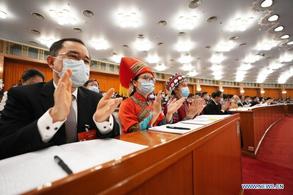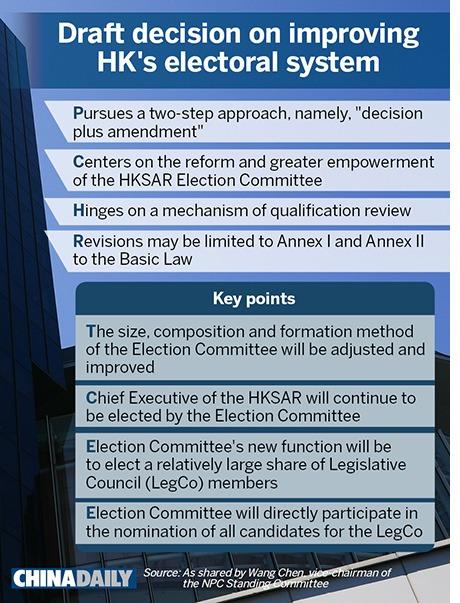 The fourth session of the 13th National People's Congress (NPC) opens at the Great Hall of the People in Beijing, capital of China, March 5, 2021. (YANG YUGUO / XINHUA)
The fourth session of the 13th National People's Congress (NPC) opens at the Great Hall of the People in Beijing, capital of China, March 5, 2021. (YANG YUGUO / XINHUA)
HONG KONG - China's top legislature is considering measures to implement in the Hong Kong Special Administrative Region (HKSAR) a new democratic electoral system suited to Hong Kong's realities and with Hong Kong characteristics, according to senior Chinese lawmaker Wang Chen.
A draft decision on improving the electoral system of the HKSAR was submitted on Friday to the fourth annual session of the 13th National People's Congress, the top legislature, for deliberation.
The electoral system of the HKSAR should conform to "one country, two systems," meet the realities in the HKSAR and serve to ensure "patriots administering Hong Kong," Wang said.
READ MORE: Youth should better understand SAR's unique political system

The overall design of the system will be centered around the reform and greater empowerment of the HKSAR Election Committee, said Wang, vice-chairman of the NPC Standing Committee, while delivering an explanatory speech on the draft at the opening meeting of the session.
The size, composition and formation method of the Election Committee will be adjusted and improved, Wang said.
The Chief Executive of the HKSAR will continue to be elected by the Election Committee, and the Election Committee will be entrusted with the new function of electing a relatively large share of Legislative Council (LegCo) members and directly participating in the nomination of all candidates for the LegCo, he said.
ALSO READ: Wang Yang calls on CPPCC to back 'patriots governing HK'
A mechanism of qualification review will be established throughout the process, Wang said.
A two-step approach, namely, "decision plus amendment" was proposed. In the first step, the NPC, in accordance with the relevant provisions of the Constitution, the Basic Law, and the Law on Safeguarding National Security in the HKSAR, makes the decision on improving the electoral system of the HKSAR.
In the second step, in accordance with the Constitution, the Basic Law, the Law on Safeguarding National Security in the HKSAR, and the NPC decision, the NPC Standing Committee amends "Annex I: Method for the Selection of the Chief Executive of the Hong Kong Special Administrative Region" and "Annex II: Method for the Formation of the Legislative Council of the Hong Kong Special Administrative Region and Its Voting Procedures" of the Basic Law, according to Wang.
The overall design of the system will be centered around the reform and greater empowerment of the HKSAR Election Committee
After the amendment of Annex I and Annex II at the state level is completed, the HKSAR will amend relevant local laws accordingly, Wang said.
The revisions to be made this time in improving Hong Kong's electoral system may be limited to Annex I and Annex II to the Basic Law, without revising the main body of the Basic Law, Wang said, in order to maintain the continuity and stability of relevant systems of the HKSAR.
"The anti-China, destabilizing elements in Hong Kong jumped on the loopholes and deficiencies to take into their hands the power to administer the city," said Wang. "To remedy the situation, it is important to take necessary steps to improve the electoral system and remove existing institutional deficiencies and risks to ensure the administration of Hong Kong by Hong Kong people with patriots as the main body."
The revisions to be made this time in improving Hong Kong's electoral system may be limited to Annex I and Annex II to the Basic Law, without revising the main body of the Basic Law
Separately, in his government work report submitted Friday to the national legislature for deliberation, Premier Li Keqiang said China will improve systems and mechanisms relating to implementing the Constitution and the basic laws in its special administrative regions (SARs).
China will continue to fully and faithfully implement "one country, two systems," according to the work report.
Also, China vows to resolutely prevent and contain external interference in Hong Kong and Macao affairs, according to the draft outline of the 14th Five-Year Plan (2021-2025) for national economic and social development and the long-range objectives through the year 2035.
China will support Hong Kong and Macao in better integrating their own development into overall national development, according to the draft outline.


